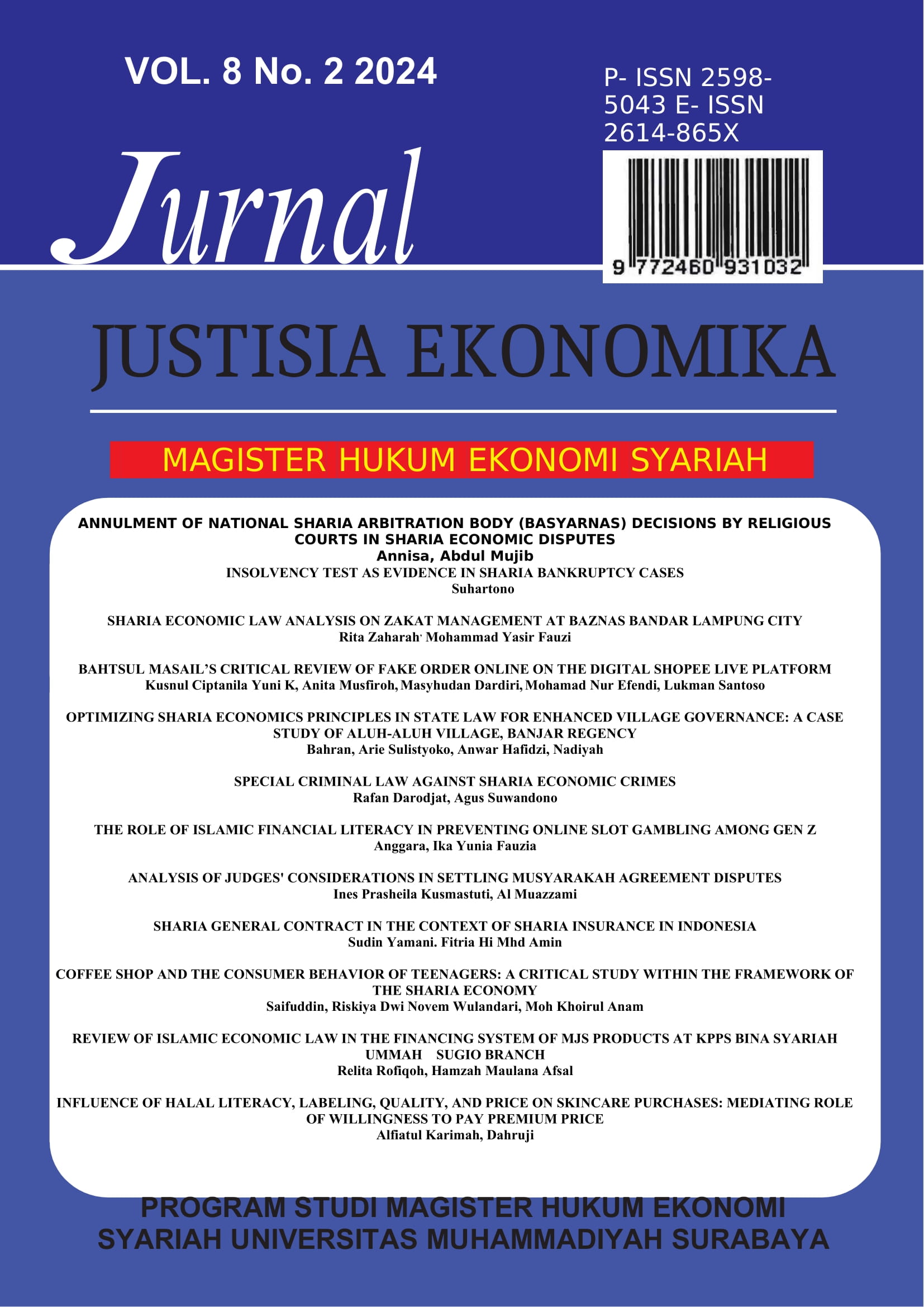ANALYSIS OF JUDGES' CONSIDERATIONS IN SETTLING MUSYARAKAH AGREEMENT DISPUTES
DOI:
https://doi.org/10.30651/justeko.v8i2.23580Kata Kunci:
Fatwa, Musyarakah, Dispute Resolution, Judges' ConsiderationAbstrak
Judges resolving Sharia economic disputes must adhere to Sharia principles, including the DSN Fatwa. However, certain decisions still fail to consider these principles, even in cases involving musyarakah contract financing disputes. This study employs a normative approach to examine judicial considerations in resolving musyarakah contract financing disputes. Secondary data were collected through literature review and analyzed descriptively and qualitatively. The findings reveal that the legal basis used by judges in Purbalingga Religious Court Decision No. xx/Pdt.G/2020/PA.Pbg is incomplete, as it neglects the DSN MUI Fatwa on musyarakah financing and does not comply with Perma Number 14 of 2016. Judges who are obligated to apply Sharia principles failed to incorporate DSN Fatwa No. 08/DSN-MUI/IV/2000 and DSN Fatwa No. 42/DSN-MUI/VIII/2004 in their considerations. Furthermore, the nominal ta'widh imposed on the defendant was deemed inappropriate due to the lack of evidence of actual losses incurred by the plaintiff. These findings highlight the need for judges in religious courts to thoroughly explore legal and Sharia principles to ensure decisions that reflect justice, legal certainty, and expediency while adhering to Sharia principles.
Referensi
Andriani, F. (2014). Implementation of Murabahah and Musyarakah Mutanaqishah Agreements in Home Ownership Financing in Islamic Banking (Case Study at Bank Muamalat Indonesia) Fitria. Journal of Petra Marketing Management, 2(1). https://ejournal.uinsuka.ac.id/syariah/azzarqa/article/view/2078/1554
Anhar, Z. (2022). Implementation of Musyarakah Akad in Islamic Banking. Journal of Islamic Banking and Finance Science, 4(2), 110-122. https://doi.org/10.24239/jipsya.v4i2.145.110-122
Baihaki, A. (2021). Religious Courts' Complete Power to Resolve Sharia Economic Conflicts Following the Constitutional Court's Decision Number 93/PUU-X/2012. Krtha Bhayangkara, 15(2) 289-308. https://doi.org/10.31599/krtha.v15i2.711 Decision No.xx/Pdt.G/2020/PA.Pbg
Dewanto, P. (2020). Reconstruction of judges' consideration of civil dispute decisions based on the value of justice. Journal of Ius Constituendum, 5(2), 303-324. http://dx.doi.org/10.26623/jic.v5i2.2307
Effendi, J. (2018). Reconstruction of the Basis of Judges' Legal Considerations (Based on Legal Values and Sense of Living Conditions in Society). PRENADAMEDIA GROUP. https://books.google.com/books?hl=id&lr=&id=NdeDwAAQBAJ&oi=fnd&pg=PR7&dq=efendi+judge+consideration&ots=66apkADP8F&sig =YcjJ0aK-P4VfFIgjI_AsLOdQemE
Guntara, D., Asyhadi, F., & Prawiyogi, A. G. (2023). Analysis of Judges' Legal Reasoning in
Deciding Sharia Economic Cases on Default in Musyarakah Agreements. Journal of USM
Law Review, 6(2). https://doi.org/10.26623/julr.v6i2.6392
Hasanah, U., & Ichfan, H. (2021). Application of Musyarakah Akad Financing in Islamic Banking. Muhasabatuna: Journal of Islamic Accounting, 3(1), 1. https://doi.org/10.54471/muhasabatuna.v3i1.1085
Kartika, S., & Harahap, M. Y. (2023). The power to make decisions about bankruptcy settlements and the suspension of Islamic banking debt payment obligations. AL-MANHAJ: Journal of Islamic Law and Social Institutions, 5(1), 101-112. https://doi.org/10.37680/almanhaj.v5i1.2195
Najib, Lutfi A. (2024). PROBLEMS OF THE IMPLEMENTATION OF THE COMPETENCY OF THE AGENCY IN THE field of SYARIAH ECONOMY Lutfi Ainun Najib Postgraduate UIN Kiai Haji Achmad Siddiq Jember, East Java, Indonesia Sri Lumatus Sa'adah Postgraduate UIN Kiai Haji Achmad Siddiq Jember, East Java, Indon. 18(3), 1807-1819.
Pertaminawati, H. (2019). Forms of Sharia Economic Disputes and Their Resolution. Dirasat: Journal of Islamic & Civilization Studies, 14(02), 59-83. https://dirasat.id/JSIP/article/view/84
Pusat Pengembangan Publikasi Ilmiah ( P3I) Universitas Muhammadiyah. (2021), Pengembangan Hukum Ekonomi Syariah Melalui Profesionalisme Pendidikan Dan Spiritual Quotient. Edited by Warsidi. UMSurabaya Publishing)
Rasyid, A., & Putri, T. A. (2019). The Dispute Settlement Authority An Examination of Decision Number 93/PUU-X/2012 of the Constitutional Court. Judicial Journal, 12(2).
Rosidah, Z. N., & Karjoko, L. (2021). Philosophical Orientation of Religious Court Judges in Resolving Sharia Economic Disputes. Ius Quia Iustum Law Journal, 28(1), 163-182. https://doi.org/10.20885/iustum.vol28.iss1.art8
Santoso, M. A. (2016). Competence of Religious Court Judges in Resolving Sharia Economic Disputes. http://repository.radenintan.ac.id/416/
Saripudin, U. (2021). Shirkah and its Application in Islamic Financial Institutions. Eqien, 4(1), 63- 79
Setiawati, N. U., & Usanti, T. P. (2018). Breach of Promise Criteria in Musyarakah Financing in Islamic Banks. Lex Journal: Law & Justice Studies, 2(2). https://doi.org/10.25139/lex.v2i2.1410
Taufiqurrohim, A. A., & Al Munawar, F. A. (2022). Ijtihad Method and Legal Considerations of Judges of the Blitar Religious Court in the Hajj Talangan Fund Case of Sharia Economic Disputes Decision Number 3333/Pdt. G/2014/PA. BL. Journal of Islamic Business Law, 6(2).
Warsidi. Strategi Pemasaran Produk Bank Syariah. Yogyakarta: Zahir Publishing, 2023.
Widyarini. Syamsul Hadi. (2016). MUI Fatwa, PSAK, and Musyarakah Practice. Istinbáth, 15(1).
Unduhan
Diterbitkan
Cara Mengutip
Terbitan
Bagian
Lisensi
HAK CIPTA
Penulis yang mengirimkan artikel dalam jurnal Justisia Ekonomika harus memahami dan menyetujui persyaratan tentang hak cipta jurnal Justisia Ekonomika sebagai berikut:
1. Hak Cipta tulisan / artikel yang diterbitkan di jurnal Justisia Ekonomika otomatis menjadi hak pengelola jurnal atau publisher
2. Meskipun Hak Cipta atas tulisan yang telah diterbitkan di jurnal Justisia Ekonomika adalah menjadi haknya publisher, tetapi penulis masih mempunyai hak untuk : a). Penulis boleh meng-upload di repository kampus, b). Penulis boleh meng-upload di webnya sendiri, c). Penulis boleh meng-upload di google schoolar, orchid dan sinta
LISENSI
Lisensi atas tulisan / artikel yang diterbitkan di jurnal Justisia Ekonomika adalah menggunakan Creative Commons dengan atribusi CC-BY-NC 4.0






















